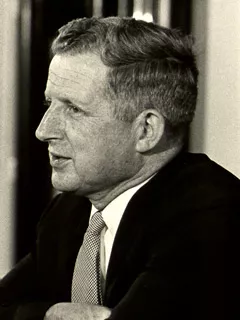Robert D. Cross
1969–1971*

Admired by students for his integrity and open style, Robert D. Cross (1924–2003) guided Swarthmore through the challenges brought by the Vietnam War, civil rights, and changing social mores. He also modernized the College’s management structure, creating the positions of provost and vice president for development. However, a number of contentious issues clouded his brief tenure.
A two-day sit-in in his office during his first year preceded the establishment of the Black Cultural Center. Protests about war in Cambodia and Vietnam occurred on campus. Students also pushed for coed housing, which the Board eventually approved during Cross’s tenure.
Cross also dealt with revelations about FBI surveillance of students and the College. Documents allegedly stolen from a local FBI office revealed that some College staff members were indiscriminately cooperating with the agency when approached for information. Cross prescribed that future responses to outside requests were to be handled with “intelligent restraint.”
Completing a B.A. and a Ph.D. in American civilization at Harvard, Cross interrupted his college career from 1943 to 1946 to serve in World War II as a B-17 pilot. A specialist in American religious and social history, Cross joined the Swarthmore faculty in 1952 and taught for seven years, during which time he also served for a year as the College’s first director of admissions and wrote his most important book, The Emergence of Liberal Catholicism in America (1958).
Prior to Swarthmore, Cross taught at Columbia University from 1959 to 1967 and served briefly as president of Hunter College. After he resigned from Swarthmore, Cross became dean of the faculty of arts and sciences at the University of Virginia, where he taught history until his retirement in 1994.
* From 1972 to 1973, Edward K. Cratsley served as acting president.



